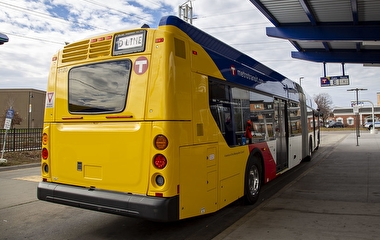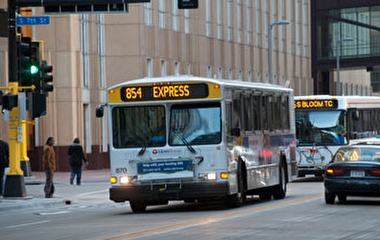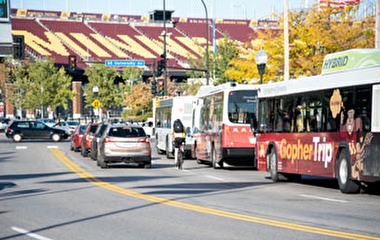COVID-19 is bringing greater attention to the personal and societal hardships of social isolation. A U of M team recently received a grant to study the role of transportation in addressing social isolation, with particular focus on older adults.
“Older adults face unique risks related to social isolation and loneliness, largely because of the many major life transitions that they are more likely to experience,” says Carrie Henning-Smith, an assistant professor at the School of Public Health, the project’s principal investigator.
In many cases, aging includes losing the ability to drive. Engaging in social and civic opportunities, however, often requires traveling outside the home. Such travel can be complicated by health problems that make it difficult to drive and that may require accessible transportation options. “Solutions to address social isolation and loneliness need to include public transportation as a key factor,” Henning-Smith says.
Even before COVID-19, recent research has shown a widespread prevalence of social isolation. “Connecting people to resources, community amenities and events, and to one another using public transportation is one promising avenue,” she says. “Our research will help us understand how best to do so in different geographic contexts across the US.”
Strategies need to take both geographic and societal contexts into account. Factors such as public transportation, community infrastructure, population density, broadband Internet, and cellular connectivity are all essential to promoting social connectedness, “yet they are uniquely challenging in both urban and rural areas,” says Henning-Smith, who is also the deputy director of the U’s Rural Health Research Center.
The study, funded by the National Center for Mobility Management, will explore a number of questions:
- What data are available to monitor and evaluate the relationship between transportation and social isolation?
- What other associated factors contribute to social isolation, beyond public transportation challenges?
- What examples exist of successful models or practices, and what outcomes and learnings can be gleaned from those activities?
- What are the impacts of transportation availability on various stakeholder groups?
- Where are areas of opportunity for collaboration and change between public transportation and public health?
The researchers will conduct interviews with content experts from around the nation and identify promising practices and exemplar programs. They will also prepare case studies of success stories, along with lessons learned from unsuccessful approaches, for rural, suburban, and urban areas. The final report will include specific, actionable policy and programmatic recommendations.
Other members of the research team include Professor Yingling Fan of the Humphrey School of Public Affairs and Christina Worrall, a senior research fellow at the State Health Access Data Assistance Center in the School of Public Health’s Division of Health Policy and Management. The project is slated to be completed early this summer.



